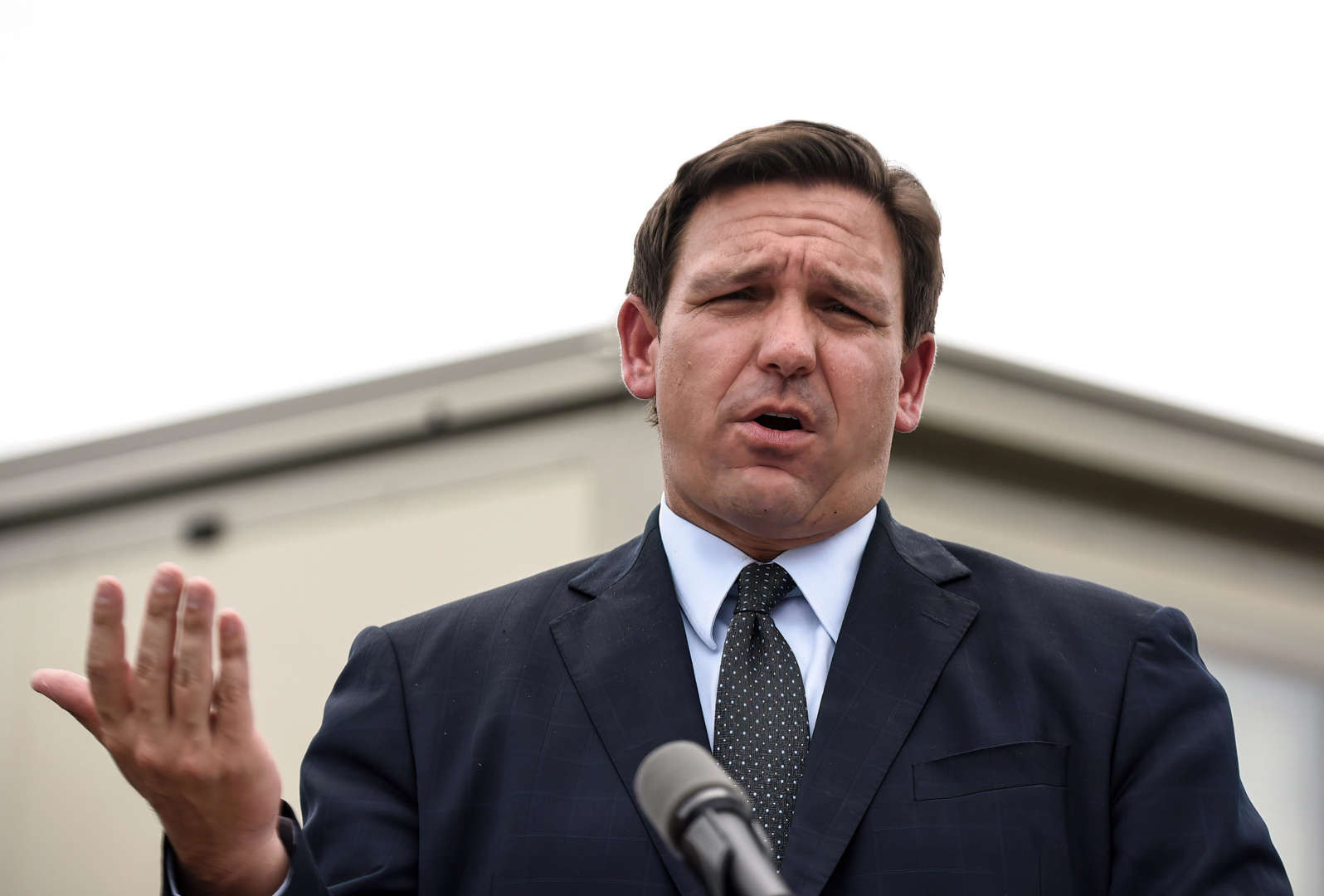The beauty of Hillary Clinton’s new book title, What Happened, can be interpreted in so many ways.
Perhaps it’s a definitive account of the 2016 presidential election. “Here’s what happened”.
Maybe it’s an exclamation, like someone reacting to an unexpectedly loud noise (or an electoral earthquake). “Yikes! What happened!?”
Then again, it could be a stern mom, who just walked in on the mess her children (the voters) made in the living room. “Whaaaaat happened …”
Or is she the dazed boxer, picking herself up off the canvas after getting knocked out by a surprise punch from her opponent.
“Wha-, wha-, what happened???”
It’s up to readers to decide for themselves, but in Mrs Clinton’s recent interviews and in her book, which was formally released on Tuesday, she offers plenty of explanations from which to choose.
Here’s a list of just some of the factors to blame for the fact that she’s hitting book stores across the country, while Donald Trump is redecorating the Oval Office.
James Comey
“If not for the dramatic intervention of the FBI director in the final days we would have won the White House.”
This isn’t the first time Mrs Clinton has said the former FBI director – who wrote a letter informing Congress that he had reopened the investigation into the handling of classified material on Mrs Clinton’s personal email server as secretary of state – is the main culprit behind her defeat.
In her book, Mrs Clinton calls the use of that server a “dumb mistake”, but the resulting scandal was “even dumber”. And in Mrs Clinton’s eyes, Mr Comey’s blame for the matter extends to his public announcement that he would not bring charges against Mrs Clinton, despite the fact that she had been “extremely careless” in her handling of classified material.
“I don’t know quite what audience he was playing to, other than maybe some right-wing commentators, right-wing members of Congress, whatever,” Mrs Clinton said of Mr Comey’s press conference in July 2016.
Did it matter? Heading into the election home stretch, Mrs Clinton appeared to have all the momentum. Mr Trump was reeling after the decade-old Access Hollywood tape revealed he had boasted of making unwanted sexual advances.
Then Comey’s letter happened, and for nearly a week the story dominated the media, casting a cloud over Mrs Clinton and giving Mr Trump room to win back his Republican base. In a race as close as this one turned out to be, it was likely enough to tip the balance to the Republican.
Vladimir Putin
“I never imagined that he would have the audacity to launch a massive covert attack against our own democracy, right under our noses – and that he’d get away with it.”
Although few knew it at the time, there was mounting evidence over the course of the 2016 election that Russia was attempting to influence the outcome.
Through hacking of Democratic Party emails and state electoral databases, social media advert purchases and bots, and the proliferation of political propaganda, the US intelligence community has concluded that Russian President Vladimir Putin was attempting to put his finger on the electoral scale in favour of the Republican.
Mrs Clinton, needless to say, is not amused. What’s more, she is convinced that members of the Trump team colluded with Russia to help get the Republican nominee elected.
“There certainly was communication and there certainly was an understanding of some sort,” she said in an interview with USA Today.
Did it matter? If what we know Russia did is all that Russia actually did, then it almost certainly wasn’t enough to hand Mr Trump the election (although it is, and should be, a major cause for concern going forward).
Mrs Clinton compares Russian influence to the equivalent of a major outside political action committee contributing to a candidate.
Of course, the Democrat had plenty of those kind of organizations at her disposal – and vastly outspent her opponent – and she still lost.
Barack Obama
“I do wonder sometimes about what would have happened if President Obama had made a televised address to the nation in the fall of 2016 warning that our democracy was under attack. Maybe more Americans would have woken up to the threat in time. ”
According to media reports, part of the reason why the nation didn’t know about the evidence implicating Russia in election meddling until after the election is because President Barack Obama wouldn’t go public unless he had the support of Republicans in Congress.
Without that support, the president kept quiet – concerned that any action he took would be viewed as being done for partisan benefit.
Mrs Clinton has plenty of words for Republican Senate Majority Leader Mitch McConnell, as well, who she said shamefully put partisanship ahead of national security.
“McConnell knew better,” she writes, “but he did it anyway.”
Did it matter? During the campaign, Mrs Clinton tried to make the case that Mr Trump was a Russian “puppet”, who took too soft a stand against Mr Putin’s aggressive foreign policy. “You’re the puppet,” was the Republican’s famous debate-night retort. Americans largely shrugged it all off, but perhaps the attacks would have stuck if it had been clear that Russia’s machinations reached well beyond Ukraine.
The media
“Many in the political media … can’t bear to face their own role in helping elect Trump, from providing him free airtime to giving my emails three times more coverage than all the issues affecting people’s lives combined.”
It’s no secret that Mrs Clinton isn’t happy about the way the media covered the presidential race. She singles out the New York Times, in particular, which she accuses of “shoddy reporting” about her use of a private email server and over-hyping Mr Comey’s election-eve letter announcing the FBI was reopening its investigation.
“The Times was by no means been the only – or even the worst – offender,” she writes, “but its treatment has stung the most.”
Did it matter? Mr Trump was an unconventional candidate who garnered an unprecedented amount of media attention – and ratings. His regular disregard for political norms, his seeming invulnerability to scandals that would sink typical politicians meant reporters were hard-pressed to cover the race in the traditional both-sides-get-their-say manner. Mrs Clinton may complain that the media weren’t being fair, but Mr Trump was playing by a different set of rules.
Bernie Sanders (and his supporters)
“His attacks caused lasting damage, making it harder to unify progressives in the general election and paving the way for Trump’s ‘Crooked Hillary’ campaign.”
Mrs Clinton still has a bone to pick with her Democratic primary opponent Vermont Senator Bernie Sanders, as well.
She writes that he impugned her character, made unrealistic promises that put her in the position of being a wet-blanket realist and did little to confront those in his movement who were launching “ugly and more than a little sexist” attacks on her supporters.
Mrs Clinton also points out that Mr Sanders is not a member of the Democratic Party and, consequently, may not always have the party’s best interests in mind.
“I am proud to be a Democrat, and I wish Bernie were, too,” she writes.
Did it matter? According to several post-election surveys, as many as 12% of Sanders supporters ended up voting for Mr Trump. If they had opted for Mrs Clinton, that would have been more than enough to put her over the top in Pennsylvania, Michigan, and Wisconsin – and give her the White House. Then again, the percentage of cross-party voting in 2016 wasn’t unusual compared to historical norms.
Jill Stein
“There were more than enough Stein voters to swing the result, just like Ralph Nader did in Florida and New Hampshire in 2000.”
The last time a presidential candidate won the popular vote but lost the election thanks to the state-by-state idiosyncrasies of the Electoral College was in 2000, when Republican George W Bush beat Democrat Al Gore.
This historical quirk was clearly in Mrs Clinton’s mind as she wrote this book, as she draws a comparison between Mr Nader’s Green Party campaign and Jill Stein’s in 2016.
The 2000 gap between Mr Bush and Mr Gore in Florida was 537 votes, so just a fraction of the 97,488 votes Mr Nader received in that state would have tipped the election to the Democrat.
Did it matter? In 2016 Ms Stein received 1,457,216 votes, the first time since 2000 that the Green Party had topped the million mark. Put Ms Stein’s Pennsylvanian, Wisconsin and Michigan voters in Mrs Clinton’s column, and the Democrat wins. Given that Ms Stein didn’t have much visibility during the election cycle, however, her performance probably was more a reflection of dissatisfaction with Ms. Clinton, than anything the Green Party candidate did or didn’t do.
Sexism
“This has to be said. Sexism and misogyny played a role in the 2016 presidential election. Exhibit A is that the flagrantly sexist candidate won.”
Mrs Clinton was the first woman to be a major party presidential nominee. At key moments – such as when she locked up the nomination during the primaries and when she gave her acceptance speech at the Democratic National Convention – she explicitly acknowledged this fact. Other times, she downplayed it.
The groundbreaking nature of her campaign, however, was always in the background. On election day, women put flowers on the graves of famous leaders of the women’s suffrage movement, in anticipation of a historic night to come.
That, of course, didn’t happen – and, in Mrs Clinton’s view, her gender was an obstacle she had to overcome.
“I started the campaign knowing that I would have to work extra hard to make women and men feel comfortable with the idea of a woman president,” she said during a CBS interview. “It doesn’t fit into the stereotypes we all carry around in our head. And a lot of the sexism and the misogyny was in service of these attitudes. Like, you know, ‘We really don’t want a woman commander in chief’.”
Did it matter? The thing about historic firsts is that there is no standard by which to judge them. Mrs Clinton had remarkably high negative ratings for a modern presidential nominee (as did Mr Trump). Was this because of her gender or an aspect of her personality that some voters found off-putting? “What makes me such a lightning rod for fury?” Mrs Clinton writes. “I’m really asking. I’m at a loss.” Until there’s another female nominee (or more), it will be difficult to know for certain.
White resentment
“He was quite successful in referencing a nostalgia that would give hope, comfort, settle grievances, for millions of people who were upset about gains that were made by others … millions of white people.”
Mrs Clinton has plenty of criticism of Mr Trump in her book, from his naivete to his sexism to his dangerous and ill-conceived policies. During her interview with CBS, however, the former Democratic nominee was particularly blunt about what she viewed as the explicit attempts by the Trump campaign to stoke racial resentment among white working-class voters.
Her critique picks up on a particularly testy exchange between Trump and Clinton campaign aides in a post-election forum, where Clinton communications director Jennifer Palmieri said Mr Trump gave a platform to white supremacists and that she would “rather lose than win the way you guys did”.
Did it matter? Whether you call it playing to racial grievances or giving hope to socially and economically anxious voters, there’s no question that Mr Trump had a message that resonated with many members of the white working-class.
Hillary Clinton
“You can blame the data, blame the message, blame anything you want – but I was the candidate. It was my campaign. Those were my decisions.”
Political analyst Mark Shields likes to note that in few professions is failure on such prominent display as in the world of politics. If the average Joe doesn’t get a promotion, the local paper won’t devote entire articles to what character flaw or personal mistake is to blame.
“Politicians boldly risk public rejection of the kind that the rest of us will go to any lengths to avoid,” he writes.
Any attempt by Mrs Clinton to explain “what happened” in 2016 was going to be ripe for criticism. Is she talking out too much? Or not enough? Why is she blaming other people? Will she devote 300 pages to delving into why people just don’t seem to connect with her?
Although Mrs Clinton in her book is liberal with apportioning responsibility for her defeat, she sets aside plenty of space to point the finger at herself.
She calls her labeling of a certain segment of Mr Trump’s base as being in a “basket of deplorables” as a “political gift” to her opponent. She says she deeply regrets her remarks about how government policies were going to put coal workers “out of business”, even if she insists they were taken out of context.
She laments that she was unable to connect with the anger and resentment that many Americans felt after the financial crash in 2008.
Most of all, she says she understands that something just didn’t click between her and many US voters.
“I have come to terms with the fact that a lot of people – millions and millions of people – decided they just didn’t like me,” she writes. “Imagine what that feels like,”
Did it matter? Mrs Clinton has written her book and stated her case that, despite any personal flaws, it was a perfect political storm that dashed her presidential dreams. In the end, history will be the judge.








